Revisiting the “Axis of Evil” – Part III
Revisiting the “Axis of Evil” – Part III
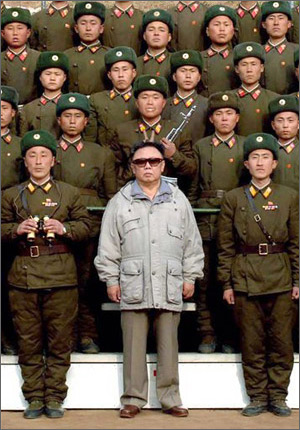
SHANGHAI: After years of negotiations and hand-wringing it has now become clear that the game of containing North Korea’s nuclear program has effectively been lost. By exploding a nuclear device in 2006 North Korea has gained an upper-hand that would allow it to have its cake and eat it too: The US and other partners of the Six Party Talks would make concessions while North Korea hangs on to its arsenal.
With its inventory of weapons-grade fissile material at possibly eight bombs equivalent, the DPRK wiped out the US policy option of military strike against Pyongyang – because a realist America has no interest in waging war with a nuclear-weapons state.
As a surreal state, the DPRK’s fundamental interest in acquiring nuclear weapons is to deter rather than to preempt, i.e., it has eyed nuclear weapons for regime security. Clearly, the DPRK’s demonstration of nuclear capability through its test explosion reverted America’s hostility. Before October 2006, the Bush administration was not so prone to peaceful means in resolving North Korea’s nuclear issue.
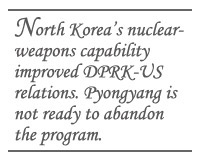
The nuclear-weapons capability of North Korea improved DPRK-US relations, and so Pyongyang is simply not ready to abandon the program. In fact, in the foreign ministers’ meeting on June 23, 2008, between Pak Ui Chun and Condoleezza Rice in Singapore, the DPRK reportedly asked for the acceptance of a nuclear-state status.
In addition to national security and power status, nuclear weapons may bring more benefits to the DPRK: By restraining its nuclear capability to some extent and implementing certain nuclear-export controls, North Korea could present itself as a responsible nuclear stakeholder. After all, the US cares more about nonproliferation and could be flexible in accommodating a proven nuclear aspirant. As noted, Pyongyang is paying a political and economic cost due to international sanctions against its nuclear development and test explosion. Therefore, a level of nuclear restraint or partial nuclear dismantling – as it has already done – may serve Pyongyang’s purpose of thawing international relations.
But given less than six months remain for the Bush administration, Pyongyang has been hard pressed to balance the benefits of national security and international relations.
If no deal is struck before President Bush steps down, Pyongyang probably must wait another year, at least, to see how the new administration in Washington frames its own North Korean nuclear policy. Presumably, the new president will be preoccupied with forming his full national-security team and in devising an overall national-security strategy with his own imprint.
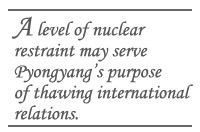
Even in the best case, the next president will focus primarily on finessing Bush’s legacy on Iraq. If Barack Obama wins, he will have to implement his vow to withdraw combat forces from the battlefield within 16 months. It’s unlikely that the North Korea nuclear question will carry higher priority.
And if Republican John McCain is elected, he probably won’t give Pyongyang favorable treatment, especially given the recently emerging case of a suspected Syrian facility, allegedly linked with North Korea, as well as the recent A.Q. Khan interview claiming that Pyongyang received nuclear exports from Islamabad as late as 2003.
It’s imperative that North Korea do something with the US in the next half year, in order to shape the contour of the next administration’s DPRK policy. However, the North has little to offer in this game, due to its security restraints and paucity of resources.
In fact, the Bush administration has already been under siege. Even though the neoconservatives are less influential these days, they maintain power in the Republican Party and keep pressing the White House on the terms for bargaining with North Korea. They demand a tough regime for a complete nuclear disablement and disarmament of North Korea. They also want to be totally free of threat from the alleged North’s uranium-enrichment program, and ask for a clear explanation of the DPRK-Syria nuclear nexus.
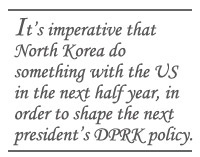
In regard to the plutonium program, the reported 30 to 40 kg of plutonium that the DPRK has declared to possess must be verified. Actually the amount the DPRK has declared might not suffice for America’s worst-case assumption. Due to fundamental distrust between the two sides, the US would not trust a DPRK declaration without a solid inspection – and one can expect that the DPRK will not accept deep inspection. To complicate the situation, Pyongyang now asks for inspections of US military facilities in South Korea to assure nuclear-free status.
Then, in regard to the alleged uranium-enrichment program, the DPRK has officially never admitted acquisition, although of course Pyongyang may have privately admitted its existence, though not at industrial scale yet. And there’s long been suspicion of Pakistan’s centrifuge transfer to the DPRK. The latest A.Q. Khan story again exacerbated concern that will reinforce the resolve of hardliners in and outside the US government and influence the next administration.
For the DPRK-Syria nuclear connection, it’s too early to claim that the Syrian side had a clandestine nuclear program and Pyongyang assisted Damascus in building a nuclear reactor. Much is cloaked in suspicion, and international inspections seem warranted after the Israeli bombing of the northern Syrian facility near al-Kibar in September 2007. The world now waits for an International Atomic Energy Agency report on this issue after the international watchdog’s recent visit to the site. Until such suspicions are cleared, the mood to de-list DPRK from “states sponsoring terrorism” doesn’t seem promising.
The US is now keen to strike a grand deal with Pyongyang in which the US will be assured with high confidence that the North’s plutonium program will be fully accounted and disarmed, while Washington can absorb the cost of not fully settling the uranium question. However, not all branches of the administration may agree. The US Congress might disagree about de-listing DPRK 45 days after the North declares its nuclear wherewithal. North Korea’s nuclear declaration and disarmament must be complete and thorough.
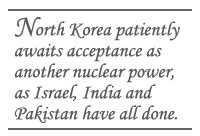
Without delivering its promise of de-listing, the Bush administration cannot expect the DPRK to further cooperate in verification and dismantlement. Adeptly handling the Clinton and Bush governments for 16 years, the DPRK attained nuclear-weapons capability. It’s clear that the Pyongyang regime treasures its nuclear deterrent as the ultimate security guarantor. The Bush administration’s inability to push the DPRK nuclear-disarmament agenda speedily forward could thus also serve Pyongyang’s interest.
The DPRK seems to have developed a four-fold nuclear scheme. It will make the best efforts to retain the core of its nuclear weapons and capabilities, and never abandon them completely under the current regime. It will also control the pace of nuclear talks, if after all it must relinquish certain aspects of its nuclear capability – at present trading with America some of its physical capability to generate more fissile materials. It still must deal with the next US administration with nuclear quid pro quo, to maintain its negotiation strength. Finally, it patiently awaits acceptance as another nuclear power, as Israel, India and Pakistan have all done. So far, it is DPRK rather than the US that is succeeding.
Shen Dingli is a professor and director of the Center for American Studies and executive dean of the Institute of International Studies at Fudan University in Shanghai, China.